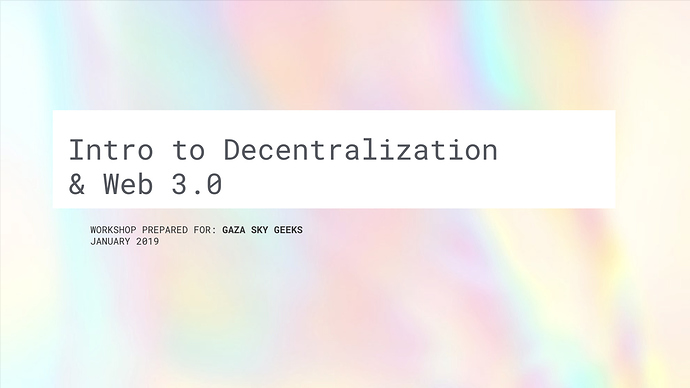@Ned, @patrick and I had an initial call with Anam Raheem from Gaza Sky Geeks today to explore the possibility of setting up a user research project and testing of our apps with the local community (tech savvy freelancers, developers and entrepreneurs who are part of the GSG programs), as well as setting up bounty programs for local developers and freelancers to include them in the process of building Status, Web 3.0, and facilitate their contributions to open source software.
Vivek Singh from Gitcoin also joined the call to walk the GSG team through the concept of bounty programs.
More info on the local context in the Gaza Strip and Gaza Sky Geeks below.
Why get involved
- Given that we are still in the process of harmonising on what we are building, who we are building it for and how we plan to do it, user testing in vulnerable communities and developing countries is one avenue we could explore to achieve and validate a product-market fit for the Status apps.
- Given the unique challenges faced by the community on the ground - online freelancers in Gaza have issues with getting paid, their banking system is totally broken - plus obvious issues related to censorship and surveillance - what Status mobile app offers could be exactly what this community needs.
Ideas we explored: user research & bounties
The first idea is focused on user research. We could start by collecting info about their context for use of open source, crypto & blockchain technologies. At first, not limited to Status but more to understand what their day-to-day needs are in terms of information seeking, conversing, transacting, etc. to explore whether this type of community does represent a target audience for Status and its products. If this turns out to be the case, further down the line this research could be expanded to other similar communities and could inform our product decisions.
The second idea is focused on setting up “easy” bounties for developers / freelancers in Gaza who could contribute to Status and get paid in SNT. The capabilities of the developers who complete their programs include: ReactJS / React Native, HTML/CSS/JS and HandlebarsJS, building restful APIs using NodeJS and mongoDB or PostgreSQL, setting up and managing deployments using Heroku and AWS, working with agile scrum, collaboration using git and Github, and setting up CI/CD pipelines with Github, TravisCI and Heroku.
Vivek suggested that user testing could be carried out via bounties too, as here in the example of Colony’s 1-Hour User-Testing Project.
About Gaza Sky Geeks
- Gaza Sky Geeks brings together online freelancers, outsourcers, and startup founders together under one roof to share ideas, learn, innovate and code.
- Founded in 2011 in partnership with Google.org and the international NGO Mercy Corps, held the first Startup Weekends in Gaza and expanded education about tech entrepreneurship.
- In 2014 GSG began working with individual startup founders to grow their businesses outside of Gaza and to develop our own incubation curriculum. In 2014 and 2015, they facilitated the first venture investments into Gazan startups.
- Today, GSG is the leading co-working space, startup accelerator, full stack code academy and freelance academy in Gaza.
- The coding classes have led to remote work for employers in the US and Europe. Dozens of freelancer training graduates have earned more than $400,000 altogether.
About Gaza
- The population of approx. 1.9 million people (including 1.3 million refugees) suffers an unemployment rate of ~ 45 percent, 68 percent of which are college graduates.
- Two-thirds of the nearly two million residents of Gaza are under 25. Most have never left this tiny territory just 41km (25 miles) long and 10km wide.
- There are only about four hours of electricity per day (GSG have their own electricity generators), the water is undrinkable, and entering or exiting the region is extremely challenging, if not impossible.
Links to articles about GSG: 1, 2, 3
Next Steps
GSG team is open to exploring with us all the initiatives mentioned above.
If we agree that this project / direction are worth pursuing, we can start with setting up bounties for a small group of developers in the GSG program and figure out a best approach to user research / testing. We also would have to find out more about the local crypto landscape, usage and access.
If we agree that this initiative makes sense beyond the GSG community, I’d be happy to help set up similar initiatives in tech communities e.g. in Myanmar and Somalia.
Would be great to discuss this in Prague. Thanks @Ned & @patrick for joining the call today. Looking forward to everyone’s questions and comments.
Disclaimer
I visited Gaza last year and was mentoring startups on the ground. I was very impressed with the quality of the GSG accelerator program, the participating startups, the incredibly hard-working, talented, motivated community, especially given their circumstances. You can find out more about mentoring options in Gaza here.
They are in need of mentors in the blockchain and web 3.0 technologies space.
One of the GSG developers was recently hired by a Berlin-based blockchain project Neufund and moved to Berlin.
